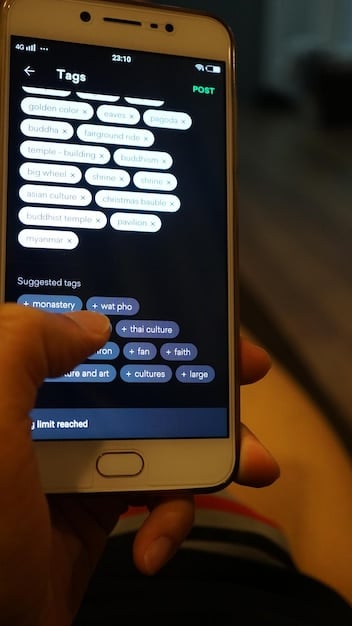AI & Mental Health: Can Chatbots Replace Therapy?

The Impact of AI on Mental Health: Are Chatbots a Substitute for Therapy? explores how AI chatbots are being used to support mental health, examining their effectiveness, limitations, and ethical considerations as potential alternatives to traditional therapy.
The digital age has brought many innovations, and among them are AI-powered chatbots designed to provide mental health support. But can these chatbots truly address the complexities of mental health, or are they merely a temporary fix? Let’s delve into the impact of AI on mental health: are chatbots a substitute for therapy? and explore their potential benefits and drawbacks.
The Rise of AI in Mental Health Support
The intersection of artificial intelligence and mental health is a rapidly growing field. AI-driven tools, particularly chatbots, are becoming increasingly accessible as a means of providing support and information to individuals seeking help with their mental well-being. This surge in popularity raises important questions about the role and efficacy of AI in addressing mental health challenges.
Several factors contribute to the growing interest in AI for mental health support. These include increased accessibility, reduced costs, and the potential for round-the-clock availability. As traditional mental healthcare systems often face challenges related to long waiting lists and high costs, AI chatbots offer a promising alternative for those who may not have access to conventional therapy.
How AI Chatbots Work
AI chatbots use natural language processing (NLP) and machine learning algorithms to simulate conversation. They are trained on vast datasets of text and speech, enabling them to understand and respond to user queries. In the context of mental health, chatbots are designed to provide empathetic responses, offer coping strategies, and guide users through mental health exercises.
- NLP: Allows the chatbot to understand and interpret human language.
- Machine Learning: Enables the chatbot to learn from interactions and improve its responses over time.
- Data Analysis: Helps the chatbot identify patterns and trends in user data to provide personalized support.

The design and functionality of these chatbots are critical to their success. They must be able to establish a rapport with users, provide accurate information, and offer support in a non-judgmental manner. The effectiveness of AI chatbots in mental health support hinges on their ability to create a safe and engaging environment for users to express their feelings and concerns.
Benefits of AI Chatbots for Mental Health
AI chatbots offer several potential advantages over traditional mental healthcare approaches. These benefits include increased accessibility, cost-effectiveness, and the ability to provide immediate support. For many individuals, chatbots represent a convenient and non-threatening way to access mental health resources.
One of the primary benefits of AI chatbots is their accessibility. Unlike traditional therapy, which may require appointments and travel, chatbots are available 24/7 and can be accessed from anywhere with an internet connection. This makes them a valuable resource for individuals in remote areas or those with limited mobility.
Accessibility and Convenience
Chatbots remove many of the barriers associated with seeking mental health support. They provide a platform for individuals to access help without the stigma or inconvenience often associated with traditional therapy. This can be particularly beneficial for those who are hesitant to seek help due to social or personal reasons.
The convenience of AI chatbots also extends to their ease of use. Most chatbots are designed with user-friendly interfaces, making them accessible to individuals of all ages and technological backgrounds. This ensures that a wide range of people can benefit from the support offered by these AI-driven tools.
- 24/7 Availability: Chatbots provide support at any time, regardless of the user’s location or schedule.
- Anonymity: Users can interact with chatbots anonymously, reducing the fear of judgment or stigma.
- Immediate Support: Chatbots offer instant access to information and coping strategies, without the need for appointments or waiting lists.
AI chatbots are not only accessible but also provide a sense of privacy. Many individuals feel more comfortable sharing their thoughts and feelings with a chatbot than with a human therapist. This anonymity can help users open up and engage more fully in the therapeutic process.
Limitations and Challenges
Despite their potential benefits, AI chatbots also have several limitations and challenges. These include the inability to provide personalized treatment, the risk of misinterpreting complex emotions, and ethical concerns related to data privacy and security. It is essential to consider these drawbacks when evaluating the role of AI in mental health support.
One of the main challenges of AI chatbots is their lack of nuanced understanding. While they can process language and provide responses based on their training data, they cannot fully comprehend the complexities of human emotions. This can lead to misinterpretations and inappropriate advice, particularly in cases involving severe mental health issues.
Lack of Personalization and Empathy
AI chatbots offer standardized responses, lacking the personalization and empathy that human therapists provide. In therapy, the therapist tailors their approach to meet the unique needs and circumstances of each individual. This level of customization is difficult to replicate with current AI technology.
The ability to empathize is another critical component of effective therapy. Empathy involves understanding and sharing the feelings of another person, which requires emotional intelligence and human connection. While AI chatbots can simulate empathy, they cannot provide the genuine emotional support that a human therapist can.
- Standardized Responses: Chatbots provide pre-programmed responses that may not address the specific needs of each user.
- Limited Emotional Intelligence: Chatbots cannot fully understand or respond to complex emotions.
- Lack of Human Connection: The absence of a genuine human connection can hinder the therapeutic process.

The inability of AI chatbots to provide personalized and empathetic care raises concerns about their effectiveness as a substitute for traditional therapy. While they may be helpful for providing basic information and coping strategies, they are not equipped to handle the complexities of severe mental health issues.
Ethical Considerations and Data Privacy
The use of AI in mental health raises several ethical concerns related to data privacy, security, and the potential for bias. It is essential to address these issues to ensure that AI chatbots are used responsibly and ethically in mental healthcare.
Data privacy is a significant concern, as AI chatbots collect and store personal information about their users. This data may include sensitive details about their mental health, emotional state, and personal history. Protecting this information from unauthorized access and misuse is critical to maintaining user trust.
Ensuring Data Security and Confidentiality
Data security measures, such as encryption and access controls, are essential to protect user data from cyber threats and breaches. These measures should be implemented throughout the entire lifecycle of the data, from collection to storage to deletion.
Confidentiality is another key ethical consideration. Users must be assured that their interactions with AI chatbots will be kept private and that their information will not be shared with third parties without their consent. Transparency about data usage policies is essential to building user trust.
- Data Encryption: Protecting user data with encryption to prevent unauthorized access.
- Access Controls: Limiting access to user data to authorized personnel only.
- Transparency: Being transparent about data collection and usage policies.
In addition to data privacy and security, there are also concerns about bias in AI algorithms. If the data used to train AI chatbots contains biases, these biases may be reflected in the chatbot’s responses. This can lead to discriminatory or unfair treatment of certain user groups.
The Future of AI in Mental Healthcare
Despite their limitations, AI chatbots have the potential to play a significant role in the future of mental healthcare. As AI technology continues to advance, chatbots may become more sophisticated and capable of providing personalized and empathetic support. Integrating AI with traditional therapy could offer a comprehensive and accessible approach to mental healthcare.
One of the key trends in the future of AI in mental healthcare is the development of personalized chatbots. By using advanced machine learning techniques, chatbots can learn from user interactions and tailor their responses to meet the specific needs of each individual. This level of personalization could significantly enhance the effectiveness of AI chatbots.
Integrating AI with Traditional Therapy
Combining the strengths of AI and human therapists can lead to a more effective and comprehensive approach to mental healthcare. AI chatbots can provide preliminary support and information, while human therapists can offer personalized treatment and emotional support.
This integrated approach can help to address the limitations of both AI chatbots and traditional therapy. AI chatbots can provide round-the-clock support and reduce the burden on healthcare systems, while human therapists can offer the nuanced understanding and emotional intelligence that AI lacks.
- Hybrid Models: Combining AI chatbots with human therapists to provide comprehensive care.
- Personalized Treatment: Using AI to tailor treatment plans and interventions to meet individual needs.
- Remote Monitoring: Utilizing AI to monitor patient progress and provide timely interventions.
The future of AI in mental healthcare also includes the development of virtual reality (VR) and augmented reality (AR) applications. These technologies can create immersive and engaging experiences that help individuals manage their mental health. For example, VR therapy can be used to treat anxiety disorders and PTSD.
In conclusion, while AI chatbots are not a complete substitute for therapy, they offer a valuable tool for providing accessible and convenient mental health support. As AI technology continues to evolve, it has the potential to transform the way we approach mental healthcare.
| Key Point | Brief Description |
|---|---|
| 💡 Accessibility | Chatbots provide 24/7 mental health support, overcoming geographical and scheduling barriers. |
| 🤖 Limitations | They lack personalized empathy and can misinterpret complex emotions. |
| 🔒 Ethics | Data privacy and algorithm bias are significant concerns. |
| 🔮 Future | Integration with traditional therapy and VR/AR offers potential for enhanced care. |
Frequently Asked Questions
▼
AI chatbots can offer immediate support and information. However, they are not a substitute for personalized therapy, especially in cases of severe mental health issues. They are better suited for preliminary support.
▼
Data privacy is a significant concern. Chatbots collect sensitive personal information. It is crucial to ensure data encryption, access controls, and transparency about data usage policies to protect user privacy.
▼
No, AI chatbots cannot fully replace human therapists. They lack the emotional intelligence and nuanced understanding needed for personalized therapy. However, they can complement traditional therapy by providing accessible initial support.
▼
AI chatbots are trained using vast datasets of text and speech. Natural language processing (NLP) and machine learning algorithms enable them to understand and respond to user queries, providing empathetic responses and coping strategies.
▼
Ethical considerations include data privacy, potential biases in algorithms, and the need for transparency in how the AI is used. It is essential to use AI responsibly and develop measures to ensure that it is fair and does not discriminate.
Conclusion
In conclusion, while AI chatbots offer promising support for mental health, they are not a substitute for the personalized care of human therapists. Their accessibility and convenience make them valuable tools, but ethical concerns and limitations must be addressed to ensure responsible and effective use.





